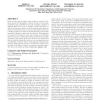Free Online Productivity Tools
i2Speak
i2Symbol
i2OCR
iTex2Img
iWeb2Print
iWeb2Shot
i2Type
iPdf2Split
iPdf2Merge
i2Bopomofo
i2Arabic
i2Style
i2Image
i2PDF
iLatex2Rtf
Sci2ools
149
click to vote
WWW
2011
ACM
2011
ACM
A demo search engine for products
Most product search engines today build on models of relevance devised for information retrieval. However, the decision mechanism that underlies the process of buying a product is different than the process of locating relevant documents or objects. We propose a theory model for product search based on expected utility theory from economics. Specifically, we propose a ranking technique in which we rank highest the products that generate the highest surplus, after the purchase. We instantiate our research by building a demo search engine for hotels that takes into account consumer heterogeneous preferences, and also accounts for the varying hotel price. Moreover, we achieve this without explicitly asking the preferences or purchasing histories of individual consumers but by using aggregate demand data. This new ranking system is able to recommend consumers products with“best value for money”in a privacy-preserving manner. The demo is accessible at http://nyuhotels.appspot.com/ Ca...
Related Content
| Added | 15 May 2011 |
| Updated | 15 May 2011 |
| Type | Journal |
| Year | 2011 |
| Where | WWW |
| Authors | Beibei Li, Anindya Ghose, Panagiotis G. Ipeirotis |
Comments (0)

